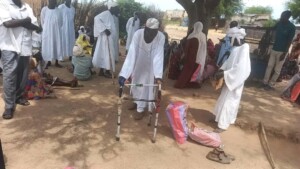New cases of suspected cholera in West Kordofan
El Ahmar village of Abu Zabad locality in West Kordofan has recorded eight new cases of acute watery diarrhoea suspected to be cholera on Monday and Tuesday.
 Cholera bacteria under a microscope (File photo)
Cholera bacteria under a microscope (File photo)
El Ahmar village of Abu Zabad locality in West Kordofan has recorded eight new cases of acute watery diarrhoea suspected to be cholera on Monday and Tuesday.
Activists in the village told Radio Dabanga that the patients have been held in a ward built with local material by the residents of the village
They explained that a team of medical assistants supervise the provision of treatment for cases of infection.
They explained that all cases of infection have been discharged after the recovery.
They explained that the area lacks health services.
Deaths
Five people died and six others were reportedly infected with watery diarrhoea in West Kordofan this month.
A medical volunteer reported that the first case was recorded in the area of El Ahmar, east of Abu Zabad, on July 9.
“Since then, the disease spread, and infected 11 people as far as we know,” he said. “Fatima El Haj, Darelsalam Adam, Ahmed Hamid, Mohamed Abdo, and Mohamed Mudawi died of it.”
The West Kordofan health authorities attributed the infections to the contamination of drinking water in the area.
Suspected cholera
Sudan has experienced an epidemic since 2016 which the Sudanese government insists on calling ‘watery diarrhoea’ in spite of numerous independent confirmations (conducted according to WHO standards) that the disease which broke out in Blue Nile state in August 2016 was cholera, the Sudanese authorities and several international organisations persistently refer to it as ‘acute watery diarrhoea’.
The WHO and the Sudanese Ministry of Health reported in mid-October that the total number of recorded cases reached more than 35,000 people – including 800 related deaths. Doctors of Sudan’s National Epidemiological Corporation reported in early July however, that nearly 24,000 Sudanese had been infected and 940 cholera patients died.
In May, Sudan’s federal Minister of Health, Bahr Idris Abu Garda, declared that Sudan is now free of the 'watery diarrhoea' outbreak (suspected to be cholera) that hit various parts of the country during the past year.
*Cholera key facts (Source: WHO)
- Cholera is an acute diarrhoeal disease that can kill within hours if left untreated.
- Researchers have estimated that each year there are 1.3 million to 4.0 million cases of cholera, and 21 000 to 143 000 deaths worldwide due to cholera.
- Most of those infected will have no or mild symptoms, and can be successfully treated with oral rehydration solution.
- Severe cases will need rapid treatment with intravenous fluids and antibiotics.
- Provision of safe water and sanitation is critical to control the transmission of cholera and other waterborne diseases.
- Safe oral cholera vaccines should be used in conjunction with improvements in water and sanitation to control cholera outbreaks and for prevention in areas known to be high risk for cholera.
- A global strategy on cholera control with a target to reduce cholera deaths by 90 per cent was launched in 2017.
Follow #CholeraInSudan, #الكوليرا_السودان for ongoing coverage by Radio Dabanga











 and then
and then